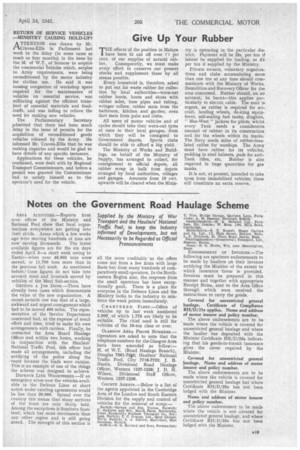Give Up Your Rubber
Page 21

If you've noticed an error in this article please click here to report it so we can fix it.
THE effects of the position in Malaya have been to cut off over F) per cent. of our supplies of natural rub
ber. Consequently, we must make every effort to conserve our present stocks and supplement these by all means possible.
Every household is, therefore, asked to put out his waste rubber for collection by local authorities—worn-out rubber boots, boots and shoes with rubber soles, hose pipes and tubing, wringer rollers; rubber mats from the bathroom, kitchen and garden; even dart mats from pubs and clubs.
All users of motor vehicles and of cycles should take their worn-out tyres at once to their local garages, from which they will be consigned to Government depots. Sports clubs should be able to afford a big yield.
The Ministry of Works and Buildings, on behalf of the Ministry of Supply, has arranged to collect, for consignment to official depots, all rubber scrap in bulk from depots arranged by local authorities, villages and garages. Amounts from 10 cwt. upwards will be cleared when the Minis
try is operating in the particular district. Payment will be 25s. per ton if labour be supplied for loading, or £1 • per ton if supplied by the Ministry.
Private owners, voluntary organizations and clubs accumulating more than one ton at any time should communicate with the Ministry of Works. Demolition and Recovery Officer for the area concerned. Rubber should, on no account, be burnt—this applies particularly to electric cable. The need is urgent, as rubber is required for aircraft, landing wheels, de-icing equipfnent, self-sealing fuel tanks, dinghies, " Mae-West " jackets for pilots, whilst every Tank needs a considerable amount of rubber in its construction and for the wheels within its tracks. The Navy needs miles of rubber-insulated cables for warships. The Army must have rubber for its vehicles, padding in steel helmets, pads for antiTank rifles, etc. Rubber is also required in huge quantities for gas masks.
It is not, at present, intended to take tyres from immobilized vehicles; these will constitute an extra reserve.




















































